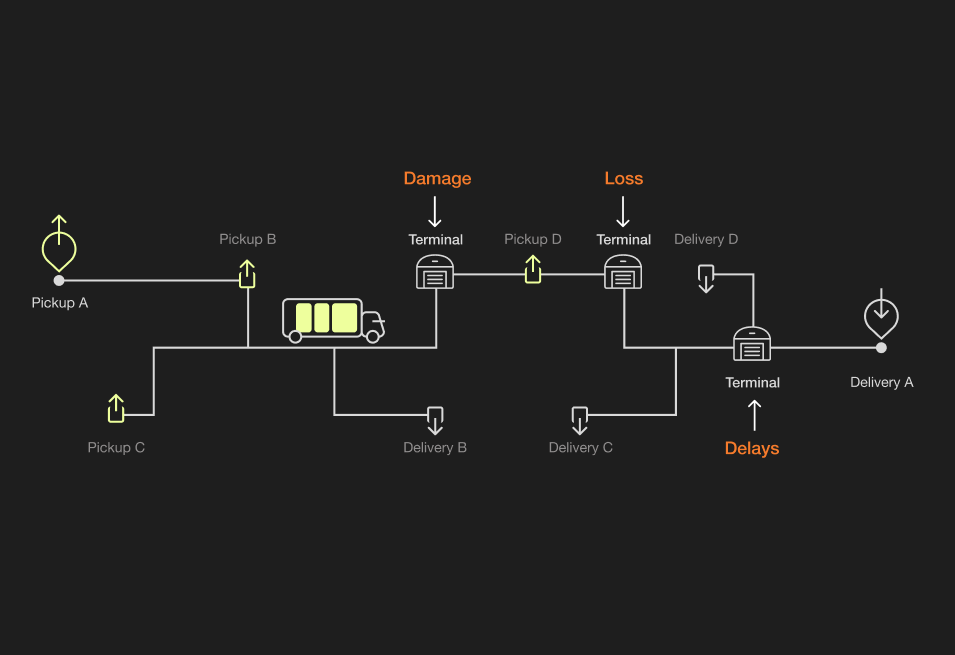How Online Freight Services Empower Shippers & Carriers

The freight industry is experiencing an unprecedented digital transformation in today's fast-paced and interconnected world. Traditional methods of booking shipments and managing logistics have given way to a new era of online freight services powered by technology, and the digital brokerage market is expected to reach $54.2 billion by 2025. With self-service freight technology, shippers and carriers can now take control of their shipping operations, streamline processes, improve customer service, and unlock the potential for greater efficiency and profitability – without hiring a logistics company.
What are online freight services?
Increasingly, shippers and carriers are relying on digital platforms to expedite logistics – obtaining quotes, scheduling shipments, and tracking freight online from a single dashboard.Online freight services are web-based solutions that allow both shippers and carriers to view and connect with potential shipping partners, and manage the logistics process from end to end. Shippers can find the best rates, choose a carrier, and keep an eye on their shipments in real time. Carriers can find available loads, submit bids, and manage their fleet more efficiently.Digital platforms often use artificial intelligence for load matching and automate parts of the process so shippers and carriers can run their businesses while spending less time handling phone calls and paperwork. Overall, online freight services make shipping simpler and more convenient for everyone involved.
Benefits of using online freight services for shippers
An online freight service can be the quickest and simplest way for shippers to find a carrier that matches their needs. These services offer several other benefits, including:
1. Access to a wide network of carriers
Online freight shipping platforms typically have established partnerships with a wide network of carriers, so shippers can choose carriers that best suit their specific requirements, such as transit time, service level, or special handling capabilities.
2. Real-time tracking and visibility of shipments
Shippers can easily track their freight online, anticipate potential delays, and provide accurate updates to their customers.
3. Automated paperwork and invoicing
An online freight broker can generate shipping documents and provide templates for bills of lading, customs documentation, and other required paperwork. This reduces the chances of errors and ensures regulatory compliance.
4. Cost savings
Shippers can easily find competitive pricing options, compare rates, and choose the most cost-effective solution for their shipments.
How online freight services work for shippers
Online freight booking services provide a digital platform that enables businesses to manage their shipping needs efficiently. Here’s how it works:
- Create a shipment request: After creating an account, shippers enter any necessary information about their freight, such as the origin and destination addresses, dimensions, weight, and any special handling requirements. Based on this input, the online freight broker provides instant quotes from multiple carriers.
- Select a carrier: Shippers can compare rates, choose the most suitable option, confirm pickup and delivery details, and provide payment information. The platform generates the necessary shipping documentation and notifies the assigned carrier about pickup details.
- Track the shipment: Throughout the transit process, shippers can track their shipments in real time and receive alerts regarding transit milestones.
- Pay for the shipment: Online freight platforms offer various payment options, so shippers can choose the one that best suits their business. Some platforms require upfront payment, while others offer credit terms for established shippers. If there are valid reasons for a refund or adjustment, the platform may facilitate the resolution process.
Functions and features vary between platforms, so shippers should research to ensure their needs will be met before signing on.
Benefits of using online freight services for carriers
Just as online freight platforms increase efficiency and offer convenience to shippers, they also provide many advantages for carriers.
1. Increased access to shipment opportunities
Online freight shipping platforms provide access to a larger pool of potential customers, allowing carriers to reach a wider market. This exposure can lead to new business opportunities and potential long-term partnerships.
2. Faster and more efficient payments
Online freight services often offer fast and secure payment processing for carriers, reducing the need for extensive invoicing and billing processes and ongoing follow-up.
3. Improved load planning
Digital platforms provide access to advanced logistics and planning tools that help optimize routes, manage schedules, and improve load consolidation. By leveraging data and analytics provided by the online platform, carriers can enhance their operational efficiency, minimize fuel consumption, and reduce transportation costs.
4. Streamlined communication with shippers
Carriers and shippers can exchange information, documentation, and transit updates through online platforms. Eliminating manual paperwork and multiple communication channels reduces the risk of errors, helps carriers proactively address potential issues, and enhances the overall customer experience.Overall, online freight services offer carriers a number of benefits they can leverage to enhance operations, optimize resources, and gain a competitive edge in the market.
How online freight services work for carriers
Using an online freight service, carriers can efficiently manage their operations, connect with shippers, and streamline their logistics processes. Here’s how it typically works:
- Find available shipments: After registering and setting up their profile, carriers can update their capacity and search for shipments that align with the routes they serve, the types of shipments they can handle (e.g., full truckload, less-than-truckload, shared truckload), and their available equipment (e.g., trailers, containers, specialized vehicles).
- Accept or reject shipment offers: Shippers can search for available carriers based on their specific requirements and submit booking requests directly through the platform. Once carriers review requests and decide whether to accept or decline the booking, the system sends shipping confirmation.
- Track and deliver shipments: The system allows carriers to generate and manage shipping documentation, fill in the necessary information, and share it with shippers. Carriers can keep shippers informed, providing real-time tracking updates from pickup through delivery.
- Receive payment: The online freight service typically manages payment processing, reducing the administrative burden associated with invoicing and collection, and may also provide carriers with access to financial reports or transaction history.
Since each platform may offer a variety of functions and features, it’s important for carriers to do due diligence before signing on, and ensure the service is the best fit for their business.
Types of freight technology used in online freight services
Technology is transforming the way shippers and carriers do business. A wide variety of freight technology solutions are helping streamline processes, enhance communication, and optimize resource utilization. Here are some key areas where freight technology has become more common.
1. Transportation management systems
TMS platforms are comprehensive solutions that offer functionalities like load planning, route optimization, carrier selection, order management, real-time tracking, and reporting.
2. Electronic data interchange
Digital freight services often integrate EDI technology to enable the electronic transmission of purchase orders, shipping instructions, and other essential documents between shippers and carriers to meet distributor requirements and reduce the risk of manual entry errors.
3. Application programming interfaces
Shippers and carriers often use multiple freight technology systems simultaneously. APIs provide a standardized way for systems to communicate and exchange data. For example, a TMS can use APIs to retrieve real-time shipment tracking data from a carrier’s system or integrate with a mapping service to calculate optimal routes.
4. Machine learning and artificial intelligence
ML and AI help automate processes and facilitate efficient decision-making. Intelligent dispatch systems, for example, can analyze historical and real-time data like driver availability, proximity to pickup/delivery locations, and customer preferences to assign the most suitable drivers to shipments and suggest the most efficient routes. Harnessing the power of logistics technology, both shippers and carriers can make data-driven decisions, optimize operations, improve communication and collaboration, and drive innovation within their organizations.
Revolutionize your shipping experience: Lean on Flock Freight for reliable online freight services
Digital transformation in the trucking industry is offering businesses of all sizes convenient and flexible solutions to meet their evolving transportation needs – helping shippers and carriers alike to increase efficiency, reduce expenses, and enhance customer satisfaction. Want to learn how Flock Freight’s patented technology helps shippers save money while delivering their freight on time and damage-free? Book a demo. Flock Freight helps carriers find the high-value loads they need to keep trucks full and drivers moving. Find out how you can optimize your operations with our innovative truckload solution. Haul with Flock.





